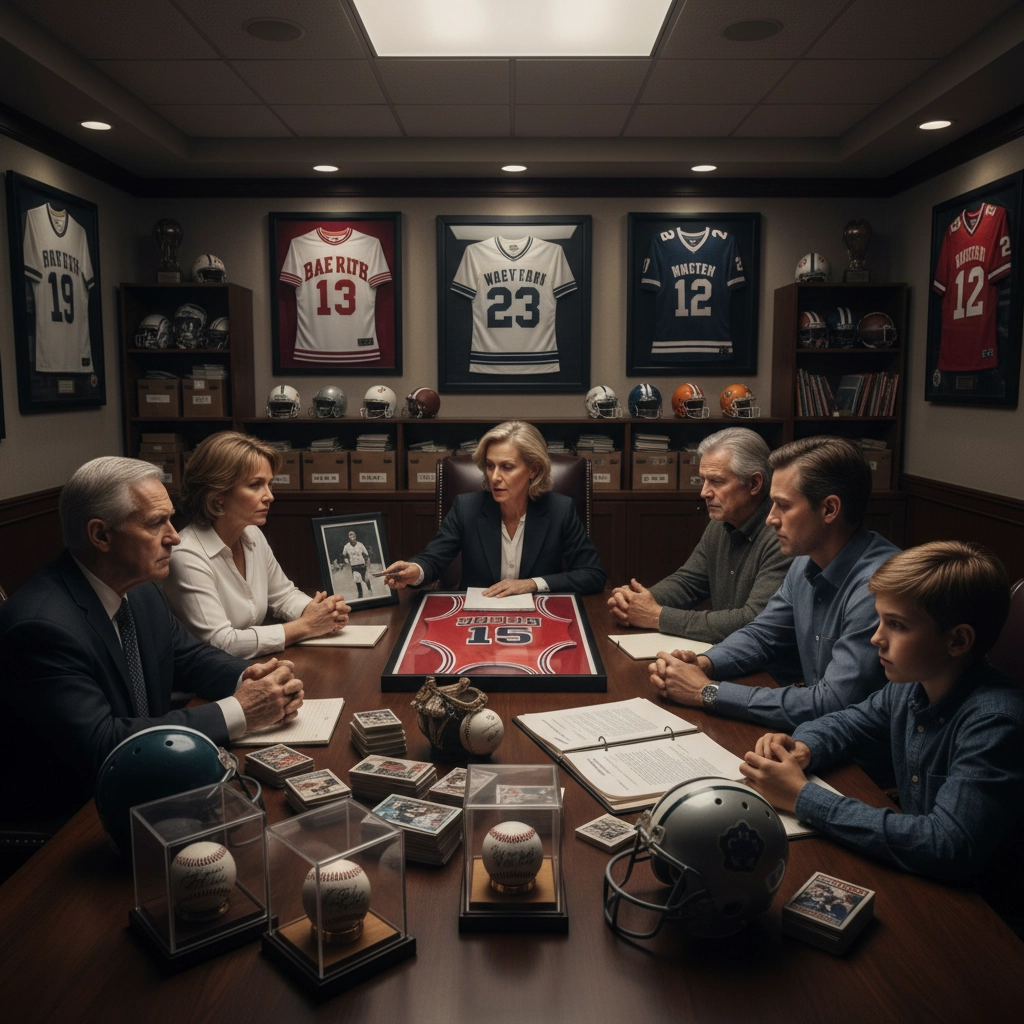Sports memorabilia, collectible cards, vintage team merchandise, and digital assets represent significant investments for dedicated fans. Estate planning for fandom-related collections requires systematic documentation and strategic distribution methods. The transfer of sports collections to heirs presents unique challenges that differ from traditional asset management.
The Reality of Collection Succession
Fan collections accumulate over decades through passionate dedication. Collectors invest substantial time, money, and emotional energy in acquiring rare items, limited editions, and authentic memorabilia. The assumption that heirs will share this enthusiasm often proves incorrect. Research indicates that younger generations frequently assign different values to collectible items compared to the original collectors.

Collection documentation becomes essential when heirs lack knowledge about specific items. Professional sports memorabilia can include autographed equipment, game-worn jerseys, championship rings, trading cards, and ticket stubs. Digital collections now encompass NFTs, virtual trading cards, and blockchain-verified authenticity certificates. Each category requires different handling procedures and valuation methods.
Documentation Standards for Sports Collections
Comprehensive inventory systems provide the foundation for estate planning. Documentation protocols should include item descriptions, acquisition dates, purchase prices, current market values, authenticity certificates, and storage requirements. Professional appraisals establish legal value for estate tax purposes and insurance coverage.
Physical collections require detailed cataloging systems. Each item needs individual identification numbers, photographs from multiple angles, and condition assessments. Authentication documentation must be preserved alongside the physical items. Storage location records prevent loss during estate transitions.
Digital collections demand different documentation approaches. NFT ownership verification requires wallet addresses, transaction records, and platform access credentials. Digital authenticity certificates need secure storage with backup systems. Blockchain verification provides permanent ownership records that survive estate transfers.
Valuation Methods for Fan Collections
Professional appraisal services specializing in sports memorabilia provide accurate market valuations. Different collection categories require specialized expertise. Vintage baseball cards need different evaluation criteria compared to modern football jerseys or basketball shoes.
Market values fluctuate based on player performance, team success, and cultural trends. Items connected to championship seasons, record-breaking performances, or retired players typically maintain stable values. Contemporary player items face greater value volatility based on ongoing career developments.

Digital asset valuation presents additional complexities. NFT values depend on platform popularity, artist recognition, and blockchain network stability. Sports-related NFTs may appreciate or depreciate based on player career trajectories and league partnerships with digital platforms.
Distribution Strategies for Heirs
Estate planning documents must specify distribution methods for collections. Options include direct inheritance to specific beneficiaries, liquidation for cash distribution, donation to charitable organizations, or hybrid approaches combining multiple strategies.
Specific bequests assign particular items to designated heirs. This method works effectively when beneficiaries express interest in particular collection segments. Sports fans within families often prefer memorabilia from specific teams, players, or time periods.
Liquidation converts collections to cash for equal distribution among multiple heirs. Professional auction houses, dealer networks, and online platforms provide sale venues. Market timing affects final sale values, requiring flexibility in estate execution timelines.
Charitable donations offer tax advantages while supporting sports-related organizations. Museums, halls of fame, and educational institutions accept significant collections. Youth sports programs benefit from equipment donations and fundraising auctions.
Trust Structures for Valuable Collections
High-value collections benefit from trust arrangements that provide ongoing management and preservation. Trusts allow detailed instructions for item care, display requirements, and eventual disposition. Professional trustees ensure compliance with estate planning objectives.
Climate-controlled storage, insurance coverage, and security systems require ongoing management expenses. Trust structures provide funding mechanisms for these operational costs. Beneficiary distributions can occur over extended periods rather than immediate estate settlement.

Collection trusts permit flexible beneficiary designations that adapt to changing family circumstances. Grandchildren may develop interests in sports memorabilia that parents lack. Trust provisions can accommodate these generational preference shifts.
Digital Asset Management
Sports-related NFTs and digital collectibles require specialized estate planning approaches. Digital wallet access, private key management, and platform account transfers need secure documentation systems. Cryptocurrency storage for digital sports assets follows similar protocols.
Platform dependencies create risks for digital collection preservation. NFT marketplaces, trading platforms, and blockchain networks face business continuity challenges. Estate plans must address potential platform failures or service discontinuation.
Digital authenticity systems provide advantages over physical verification methods. Blockchain records create permanent ownership histories that survive estate transfers. Smart contracts can automate distribution processes according to predetermined estate instructions.
Preventing Family Disputes
Clear written instructions prevent beneficiary conflicts over collection items. Ambiguous language in estate documents leads to family disagreements and legal challenges. Specific item descriptions, beneficiary designations, and distribution timelines reduce dispute potential.
Early family discussions establish expectations and identify beneficiary preferences. Some heirs prefer cash distributions over physical items. Others may want specific collection segments that reflect personal interests or memories.
Professional executors provide neutral administration for complex collections. Independent oversight ensures fair distribution processes and compliance with estate instructions. Executor selection should consider sports memorabilia expertise and collection management experience.

Modern Collection Platforms
Contemporary sports fans utilize multiple platforms for collection building and management. Traditional physical items continue alongside digital assets and hybrid authentication systems. Estate planning must address this technological complexity.
Social media platforms host virtual collection displays and trading communities. Account access information becomes part of estate documentation requirements. Platform policies regarding account transfers and inheritance vary significantly.
Sports betting, fantasy leagues, and prediction markets create additional digital asset categories. These platforms often contain accumulated credits, winnings, or purchased assets that require estate planning consideration.
Tax Implications and Strategies
Collection valuations affect estate tax calculations and beneficiary tax liabilities. Professional appraisals establish fair market values for tax reporting purposes. Charitable donations provide tax deduction opportunities for high-value collections.
Gift strategies during lifetime reduce estate tax exposure for valuable collections. Annual exclusion limits permit tax-free transfers of collection items to family members. Charitable remainder trusts combine tax benefits with retained lifetime income from collection assets.
State tax laws vary regarding collectible assets and estate planning requirements. Some states provide favorable tax treatment for certain collection categories. Professional tax advice becomes essential for substantial collections.

Implementation Timeline
Estate planning for sports collections requires systematic implementation over extended periods. Initial documentation phases establish inventory systems and professional valuations. Legal document preparation incorporates collection-specific instructions into comprehensive estate plans.
Regular updates maintain accuracy as collections grow and market values change. Annual reviews ensure estate plan alignment with current family circumstances and beneficiary preferences. Professional relationships with appraisers, trustees, and specialized attorneys require ongoing maintenance.
Storage, insurance, and security systems need periodic evaluation and upgrading. Digital platform changes require estate plan modifications to maintain asset access and control systems.
Estate planning for fandom collections demands specialized knowledge, systematic documentation, and professional guidance. The unique characteristics of sports memorabilia and digital collectibles require customized approaches that address both emotional significance and financial value. Proper planning ensures that passionate collecting efforts benefit intended beneficiaries according to collector intentions.
